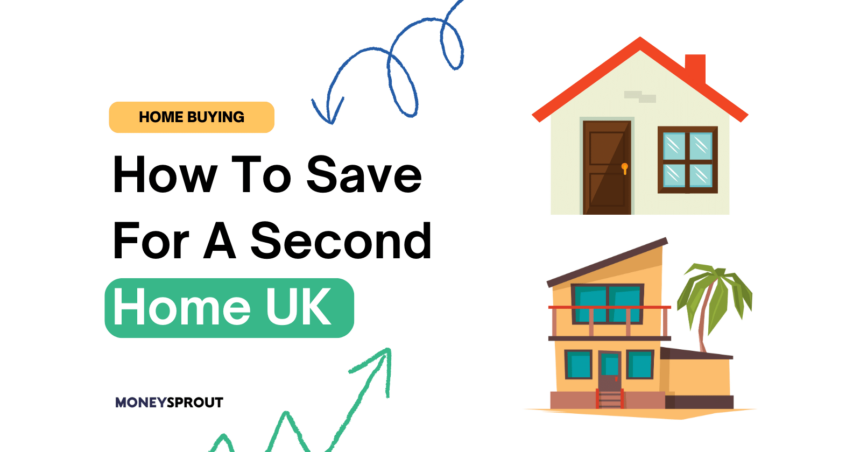Buying a home is one of the biggest accomplishments in life. But owning a second home is even better.
The perks of owning two homes have encouraged roughly one in 10 U.K. citizens to invest in second properties. However, all big purchases come with strings attached and there are several important things to consider before taking the next step.
From taxes, mortgage options, overall costs, or even making money from your new home, this article will cover everything you need to know.
Why Would You Buy a Second Home?

Before you start searching for the right property, you need to know exactly what you want from a second home. Will it be your new holiday destination or are you looking to become a property developer and sell it?
Here are some common reasons people buy second homes:
- Have a retreat for weekends and holidays
- Own a home in a place you visit often and don’t want to spend money on rent
- Put your savings into real estate which can grow in value over time
- Have a property for your parents or children
- Invest in a house or flat you will sell for a better price
- Rent out the property and collect money every month
According to the Resolution Foundation, the amount of money invested in second homes over the past 20 years has increased by 50%. One in 10 adults in the U.K. now owns two or more homes.
Second Home or Investment Property?
There is a slight difference between owning a second home and an investment property and it will impact on your taxes and mortgage rates.
A second home is a property that the owner must use as their personal home for at least part of the year. There isn’t a fixed number of days you must stay there and it will vary depending on your mortgage provider. Once you get approved for the mortgage, you have to comply with the rules of owning a second home or you might face mortgage fraud charges.
An investment property, on the other hand, comes with slightly higher taxes and mortgage rates. It’s a property used purely for earning purposes. You can rent it full-time and collect passive income each month or fix it up and flip it without ever living there.
Keep in mind that for both types of properties, all rental income is taxable and must be reported.
Mortgage and How to Get It
If you have the money saved up, you can skip this part of the article. However, most people will need a mortgage to buy a second home. If you already have one for your first home, don’t worry – it’s possible to get a second mortgage. There are some things to keep in mind, though:
- A deposit – Usually around 25% of the value of the property. This amount can vary depending on your bank but you should be ready to pay at least one-fourth of the full price immediately.
- A steady income – Just like with any loan, you need to be able to prove that your income is enough to cover the payments on both mortgages.
- Rental income details – If you want to make money with your new property by renting it, you should have some ideas and predictions for your potential renting income. Do thorough research on prices at your property’s location and compose a realistic plan.
- Your credit score – If you aren’t a reliable borrower, the lenders will be much less likely to consider you for a new mortgage. A good credit score is a must in this situation.
Buying a New Home With Equity
Instead of opting for an additional mortgage, the alternative is to remortgage your first property.
Typically, a 25% down payment is required for a second home. The average property price in the U.K. was £216,092 in 2020. Obtaining the necessary funds for an average deposit would mean increasing your mortgage by £54,023.
But how do you know how much equity you have in your home? It comes down to simple maths. You need to know the current value of your home and then deduct what you have left on your mortgage. For instance, if your home is worth £250,000 and you have £100,000 left on your mortgage, your equity is £150,000.
There is a possibility of increasing the mortgage on your first property to get the downpayment you need. Let’s say you have a 25-year mortgage with a 2% interest rate. With the average property cost in mind, you need an additional £54,000. This would result in an increment of £229 in your monthly repayment amount.
However, there are additional costs of buying a second home that you should keep in mind.
Stamp Duty on Secondary Residence
Since you already own a home, you probably know all about pay stamp duty. However, stamp duty on your second home will be higher. These rates are payable on all properties worth more than £40,000. They scale with the value of the property as well as with additional properties you own.
Let’s take a look at stamp duty rates in England and Northern Ireland for secondary properties:
- If the purchase price of a property is between £40,000 and £250,000, the stamp duty rate will be 3%.
- For properties between £250,001 and £925,000, the stamp duty rate will be 8%.
- If you’re looking at a price between £925,001 and £1.5 million, the stamp duty rate will be 13%.
- For properties worth over £1.5 million, the stamp duty rate will be 15%.
If you’re looking to purchase a second home in Scotland or Wales, the stamp duty rates will be slightly different. You can use this stamp duty calculator to see how much you’d have to pay.
Second Home Council Tax
In 2024, there are some council tax changes in the U.K. that you should keep in mind.
Scotland – In December 2023, local authorities were given the right to charge 100% higher council tax rates on secondary properties. The change will align the council tax regulations for second homes with those governing long-term empty homes starting in April 2024.
Wales – As of April 2023, the cap on council tax premiums for second homes and long-term empty properties rose to 300%, up from the previous limit of 100%.
England – Starting from April 2025, owners of second homes in England might be required to pay double the amount of second home council tax. The Levelling Up and Regeneration Act 2023 granted councils the discretion to impose an extra council tax of up to 100% on furnished homes not used as the primary residence.
Capital Gains Tax
If you’re looking to become a property developer and eventually sell your new property, there will be Capital Gains taxes to keep in mind. Due to private residence relief, this doesn’t apply to selling your main home (in most cases). However, if you’re selling a second home or an asset that has increased in value while you were the owner, you’ll have to pay this tax.
You can check the latest capital gains rates here.
Reducing the Costs of Buying a Second Home
If you feel overwhelmed by all the costs and taxes we’ve talked about so far, don’t worry just yet. There are ways to reduce them:
- Sell your primary property first – If you’re looking to buy a new home to live in, you should sell your current residence first. As mentioned before, the tax rates are higher when it comes to second homes. There’s no reason to pay them if you don’t want or need two homes.
- Think about Private Residence Relief – Capital Gains Tax won’t be applicable if you’ve lived in the property for the duration of the ownership. Keep this in mind if you’re looking to sell your second home.
- Find out if you’re eligible for a refund of the SDLT surcharge – If you buy a second home and pay the Stamp Duty Land Tax, you might be able to get it back. However, this only applies to people who sold their primary residence within three years of purchase.
How to Save Money for a New Home?
After all the costs discussed in this article, you can say with certainty that buying a second home isn’t a cheap process. However, there are small everyday steps you can take to start putting some money aside:
- Reduce everyday spending – Take a look at how much money you spend every month and see if you can make some cuts. For example, can you have coffee at home instead of buying one on your way to work? It may sound insignificant but those little daily costs add up over a year.
- Tidy up your finances – Getting your bills under control, paying off your debts, and reconsidering your service providers might help boost your mortgage plan.
- Track Your Spending – We could all use some help tracking our income and spending habits. Sometimes we aren’t aware of how much money we spend unless we see it “on paper.” Our Google sheets budget template is a great place to start.
- Earn extra money – If you have time to spare, you can try finding a part-time job to boost your monthly earnings. From weekend jobs to selling old stuff on eBay, the possibilities are endless.
- Consider buying with friends – Sharing costs with friends or family is easier than having to pay for everything yourself. Ideally, you would buy with a first-time buyer aged between 18 and 39 because they might be eligible for a Lifetime ISA account.
The Benefits of a Second Home
Buying a second home is a big yet worthwhile investment. Once you get approved for mortgage or even a second mortgage, the whole process becomes a lot easier. Don’t forget you can also use equity to pay for your new home and if the costs scare you, start saving up.
Focus on the positive, such as owning a home at your favourite holiday destination, collecting passive income in rent, or having a place where your children or parents can stay.
Read More From Money Sprout:




